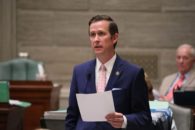JEFFERSON CITY, Mo. — A staffing shortage in the face of increased demand is one of the largest obstacles for the Missouri Department of Mental Health (DMH), Director of Behavioral Health Nora Bock told lawmakers Wednesday.
The COVID-19 pandemic impacted an already struggling workforce, Bock said, with burnout and low wages taking their toll on the department over the past year.
“Our crisis in the facilities is staffing — those that have stuck with it through the pandemic have been incredible,” Bock said. “There’s a lot of folks out there who need to put food on the table, and they’ve got to go where the money is.”
DMH Director Mark Stringer said staffing was a root issue as more people look at mental health in the wake of the pandemic: While the department hopes to expand its services through new health centers, he said the department would struggle to staff them without an increase in wages.
Missouri ranks No. 12 in need for mental health services but No. 31 in access, according to Stringer.
Stringer and Bock appeared before the House Subcommittee on Mental Health Policy Research for more than three hours Wednesday to discuss the challenges faced by the department and potential next steps.
Stringer pointed to the influx of federal funds coming into the state, a portion of which may be used to build out intermediate rehabilitation centers to lighten the load on hospitals.
“Every few years we pull people together to find a solution to this, and it seems every time we do the bottom falls out of the economy and we don’t have money to do stuff with — today, it may be a little different,” Stringer said. “We’re looking at some things and hope to come back with at least partial solutions to that problem.”
The pair said some of the federal COVID-19 relief grants allocated to the department were time-limited and changes were likely to come quickly. Much of the federal funds will go toward opioid overdose and suicide prevention, Bock said.
The department also hopes to invest funds into the state’s telehealth system. Bock said the new technology was a “game-changer” for patients and providers throughout the pandemic, allowing patients to continue receiving services without traveling or risking contracting the virus. The way telehealth programs are run is likely to change as studies and data on best practices become available, Bock said.
Telehealth is a focal point of the House Special Interim Committee on Broadband Development, which is scheduled to hear testimony from health care providers later this month. Grants from the Federal Communications Commission (FCC) COVID-19 Telehealth Program have also been awarded to SSM Health St. Louis and the Health Care Collaborative of Rural Missouri to bolster their telehealth programs.
Committee Chair Rep. Wayne Wallingford said the hearing put the committee on the “right track” to propose legislation next session. Wallingford said the committee would hear directly from statewide mental health institutions at another hearing later this month.

Cameron Gerber studied journalism at Lincoln University. Prior to Lincoln, he earned an associate’s degree from State Fair Community College. Cameron is a native of Eldon, Missouri.
Contact Cameron at cameron@themissouritimes.com.

































